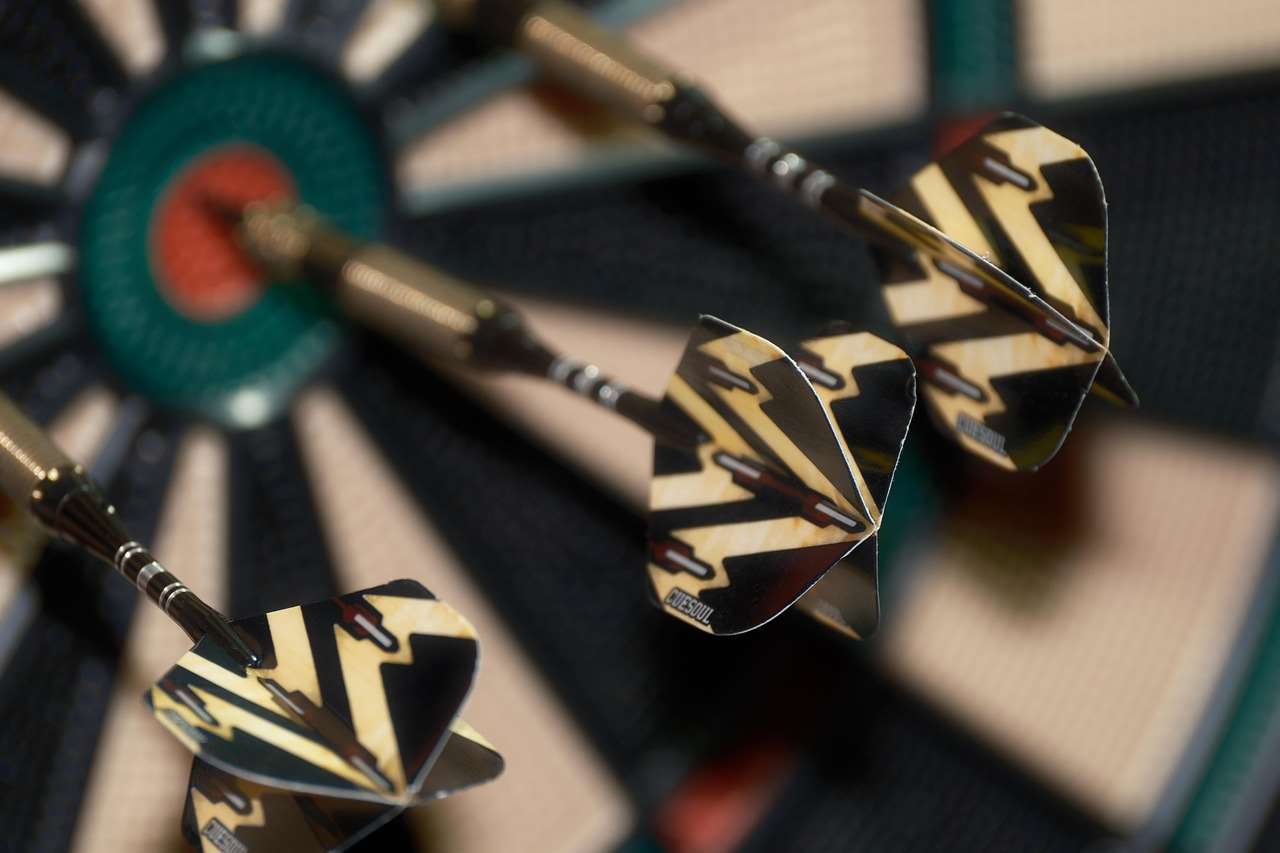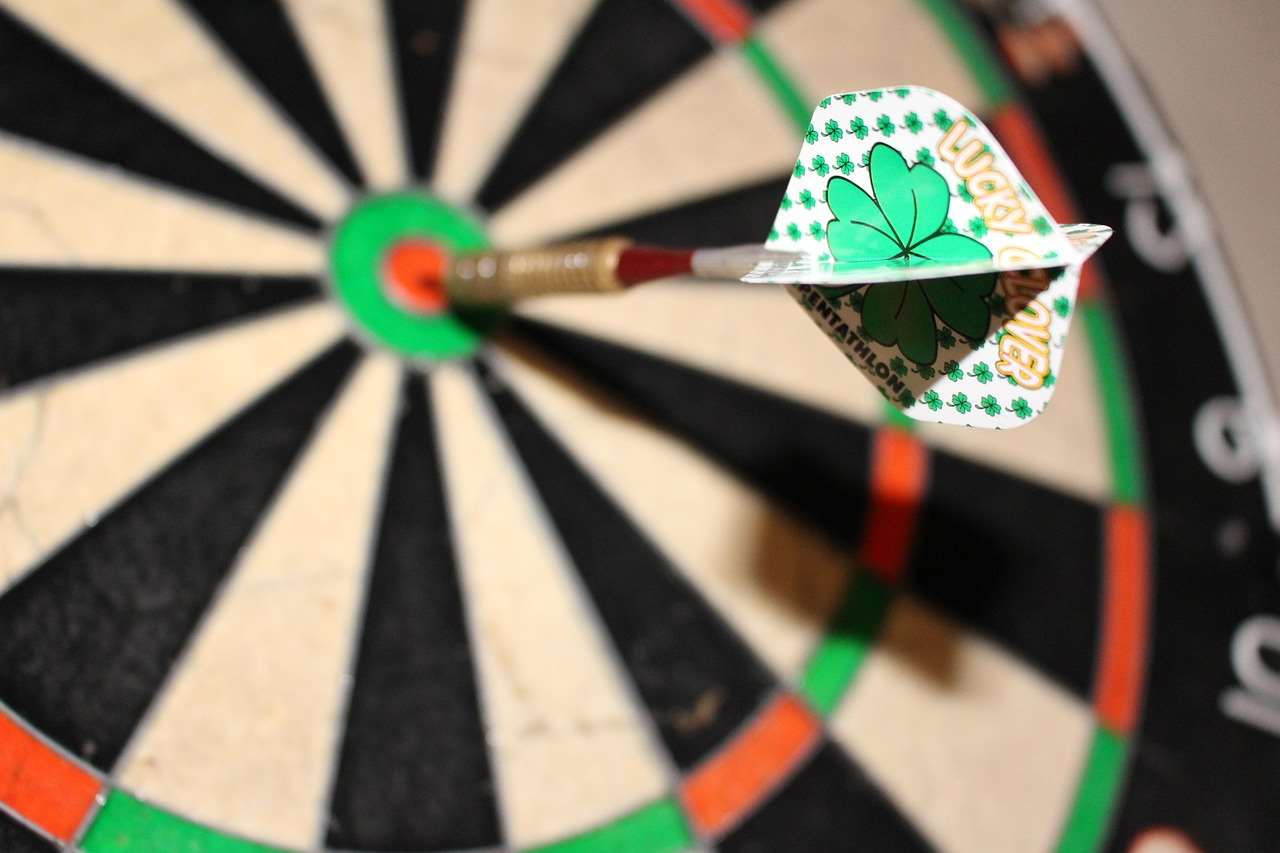Knowing the **basic darts etiquette for beginners** is just as important as understanding the rules. These guidelines ensure fair play, respect among players, and a more enjoyable experience for everyone involved. In this article, we’ll cover the essential do’s and don’ts of darts etiquette, helping you navigate your first games with confidence and grace.
⚠️ Still Using Pen & Paper (or a Chalkboard)?! ⚠️
Step into the future! The Dart Counter App handles all the scoring, suggests checkouts, and tracks your stats automatically. It's easier than you think!
Try the Smart Dart Counter App FREE!Ready for an upgrade? Click above!
Understanding Basic Darts Etiquette for Beginners
Darts, while a seemingly simple game, thrives on a foundation of respect and good sportsmanship. **Basic darts etiquette for beginners** can seem daunting, but it’s primarily about being mindful of your fellow players and creating a positive environment. Let’s break down the core elements:

Respecting the Thrower
This is arguably the most crucial aspect of darts etiquette. When a player is at the oche (the throwing line), all other players should observe the following:
- Silence is Golden: Maintain complete silence while the thrower is preparing and releasing their darts. Avoid talking, whispering, or making any distracting noises. This shows respect and allows the player to fully concentrate.
- Stay Behind the Thrower: Never walk in front of the thrower or cross their line of sight. Always remain behind them, well out of their peripheral vision.
- Avoid Unsolicited Advice: Unless specifically asked, refrain from offering advice on their throwing technique or strategy. Unwanted advice can be disruptive and unwelcome.
The Oche and the Throwing Line
The oche is more than just a line on the floor; it’s a designated space where players take their turn. Proper etiquette around the oche involves:
- No Foot Faulting: Your foot (or any part of your body) must not cross the oche while throwing. Some players are very particular about this rule, so it’s best to err on the side of caution.
- Wait Your Turn: Be patient and wait for your turn to throw. Don’t crowd the oche or try to rush the game.
- Respect the Space: Avoid placing drinks or other items on the oche, as this can be distracting or even a safety hazard.
Handling Darts and the Dartboard Properly
Treating the equipment with respect is another key aspect of **basic darts etiquette for beginners**. This includes:
Dartboard Care
The dartboard is the heart of the game, so taking care of it is essential for its longevity and your enjoyment.
- Proper Dart Removal: When removing your darts, twist them slightly as you pull them out. This helps to prevent damage to the sisal fibers of the board.
- Avoid Unnecessary Force: Don’t throw your darts with excessive force. This can damage both the darts and the board.
- Rotating the Board: Regularly rotate the dartboard to evenly distribute wear and tear. This helps to extend the life of the board.
Dart Handling
Your darts are your tools of the trade. Treat them well, and they’ll perform better.
- Personal Darts: If you are using someone else’s darts, ask permission first. Treat them with care and return them in the same condition you received them.
- Safe Handling: Always be mindful of the sharp points of your darts. Avoid waving them around carelessly or pointing them at anyone.
- Don’t Tamper: Never tamper with another player’s darts without their permission.
Sportsmanship and Fair Play in Darts
Good sportsmanship is the cornerstone of any game, and darts is no exception. Let’s delve into some key aspects of fair play:
Accepting Wins and Losses Gracefully
Whether you win or lose, it’s important to maintain a positive attitude and display good sportsmanship. Here’s how:
- Congratulate Your Opponent: Always congratulate your opponent on a well-played game, regardless of the outcome.
- Avoid Excuses: Don’t make excuses for your losses. Accept defeat with grace and learn from your mistakes.
- Be Humble in Victory: Avoid gloating or bragging after a win. Acknowledge your opponent’s effort and skill.
Calling Scores Accurately
Accurate scorekeeping is crucial for fair play. Be honest and transparent when calling out scores:
- Clear and Concise: Call out your scores clearly and concisely so that everyone can hear them.
- Double-Check: If you’re unsure of your score, double-check it with your opponent or a scorekeeper.
- Honesty is Key: Never intentionally misrepresent your score. This is considered cheating and is unacceptable.

Dealing with Disputes
Even with the best intentions, disputes can sometimes arise. Here’s how to handle them constructively:
- Remain Calm: Avoid getting angry or confrontational. Take a deep breath and try to approach the situation calmly.
- Refer to the Rules: Consult the official rules of the game to clarify any ambiguities.
- Seek Mediation: If you can’t resolve the dispute yourself, ask a neutral third party to mediate.
Specific Etiquette Scenarios: Tournaments and Casual Games
The specific etiquette guidelines can vary slightly depending on the context of the game. Let’s look at some key differences between tournaments and casual games.
Tournament Etiquette
Tournaments typically have stricter etiquette rules to ensure fair play and maintain a professional atmosphere:
- Dress Code: Tournaments often have a specific dress code that players are expected to adhere to.
- Silence During Matches: Spectators are usually required to remain silent during matches to avoid distracting the players.
- Formal Procedures: Tournaments often have formal procedures for things like calling scores, handling disputes, and submitting appeals.
Casual Game Etiquette
Casual games are generally more relaxed, but basic etiquette principles still apply:
- Flexibility: Players are often more flexible with the rules in casual games. For example, they might allow players to retake a throw if they accidentally drop a dart.
- Social Interaction: Casual games are often more social, with players chatting and joking around between throws.
- Emphasis on Fun: The primary goal of a casual game is to have fun, so players are generally more forgiving of minor etiquette violations.
The Importance of Patience and Practice in Learning Darts
Darts is a skill that takes time and effort to develop. Don’t get discouraged if you don’t see immediate results. In addition to learning **basic darts etiquette for beginners**, here’s why patience and practice are key:
- Muscle Memory: Consistent practice helps to develop muscle memory, which is essential for accurate and consistent throwing.
- Technique Refinement: Regular practice allows you to refine your technique and identify areas for improvement.
- Mental Toughness: Darts is also a mental game. Practice helps you to develop the mental toughness needed to perform under pressure.
For those looking to enhance their dart skills, understanding Basic Darts Fundamentals for Beginners can be a huge step forward.

Addressing Common Beginner Mistakes in Darts Etiquette
Even with the best intentions, beginners often make common etiquette mistakes. Here’s how to avoid them:
- Walking in Front of the Thrower: This is a classic beginner mistake. Always remember to stay behind the thrower.
- Offering Unsolicited Advice: Resist the urge to give advice unless asked.
- Miscounting Scores: Pay close attention when counting your scores, and double-check if you’re unsure.
Adapting Darts Rules and Etiquette for Different Situations
Sometimes, it’s necessary to adapt the rules and etiquette of darts to accommodate different situations or skill levels. Here are a few examples:
Playing with Children
When playing with children, it’s important to be patient and understanding. You might need to modify the rules to make the game more enjoyable for them. For instance, consider Adapting dart game rules for children to suit their age and skill level.
Playing with Mixed Skill Levels
If you’re playing with a group of players with varying skill levels, you might consider using handicap rules to level the playing field. You can find more information about How to make darts fairer with handicap rules. Another great way to accommodate varying skill levels is by Modifying rules for mixed-level dart players to foster a competitive yet enjoyable environment.
Playing in Small Spaces
If you’re playing in a small space, you might need to adjust the throwing distance or modify the rules to ensure safety and prevent damage to your surroundings. Check out Adapting darts rules for small spaces: tips and tricks for practical advice.

Essential Accessories and Equipment to Enhance Your Darts Experience
While a dartboard and darts are the bare essentials, certain accessories can enhance your overall experience and contribute to better performance:
- Dartboard Surround: A surround protects the wall around your dartboard from stray darts.
- Dart Mat: A dart mat protects your floor and provides a consistent throwing distance.
- Scoreboard: A scoreboard makes it easy to keep track of scores during a game.
Understanding these accessories can elevate your game and make it more enjoyable. Remember, the spirit of darts lies not just in the throws, but in the shared camaraderie and respect. Exploring Alternative darts rules for home play can also enhance your home darting experience.
Creating a Positive and Inclusive Darts Environment
Ultimately, **basic darts etiquette for beginners** is about creating a welcoming and inclusive environment for all players. This means being respectful, considerate, and mindful of others. By following these guidelines, you can help to ensure that everyone enjoys the game of darts, regardless of their skill level or background.

So, remember these essential aspects, and embrace the traditions with respect and consideration. And who knows, maybe you’ll want to explore Fun dart game variations with modified rules once you’ve mastered the basics!
Conclusion
Mastering **basic darts etiquette for beginners** is just as vital as honing your throwing skills. By adhering to these principles, you’ll contribute to a more enjoyable and respectful environment for yourself and your fellow players. Remember to respect the thrower, handle the equipment with care, practice good sportsmanship, and adapt the rules as needed. Now that you’re equipped with this knowledge, grab your darts, step up to the oche, and enjoy the game! Are you ready to put your newfound etiquette skills to the test? Find a local darts league or challenge your friends to a friendly game. Happy darting!
Hi, I’m Dieter, and I created Dartcounter (Dartcounterapp.com). My motivation wasn’t being a darts expert – quite the opposite! When I first started playing, I loved the game but found keeping accurate scores and tracking stats difficult and distracting.
I figured I couldn’t be the only one struggling with this. So, I decided to build a solution: an easy-to-use application that everyone, no matter their experience level, could use to manage scoring effortlessly.
My goal for Dartcounter was simple: let the app handle the numbers – the scoring, the averages, the stats, even checkout suggestions – so players could focus purely on their throw and enjoying the game. It began as a way to solve my own beginner’s problem, and I’m thrilled it has grown into a helpful tool for the wider darts community.